SCANOSS Code Scan Task
The SCANOSS Code Scan task enhances your software development process by automatically scanning your code for security vulnerabilities and license compliance with configurable policies.
Usage
Before using the SCANOSS Code Scan Task, you need to install it from the Azure Marketplace. You can find it here.
Breaking change v1.0.0
- Default runtime container updated to
ghcr.io/scanoss/scanoss-py:v1.26.1
- Removed parameters:
sbomEnabledsbomFilepathsbomType
Converting from sbom.json to scanoss.json
The SBOM configuration format has changed and the file name must be updated from sbom.json to scanoss.json. Here's how to convert your existing configuration:
Old format (sbom.json):
{
"components": [
{
"purl": "pkg:github/scanoss/scanner.c"
}
]
}
New format (scanoss.json):
{
"bom": {
"include": [
{
"purl": "pkg:github/scanoss/scanner.c"
}
]
}
}
Set Up
The SCANOSS Code Scan Task uses the Azure API to create Checks and Comments on Pull Requests. Once the pipeline is available upstream, ensure you have the correct permissions set up on your repository:
Open the repository settings section:
- Project Settings
- Repositories
- Select the repository
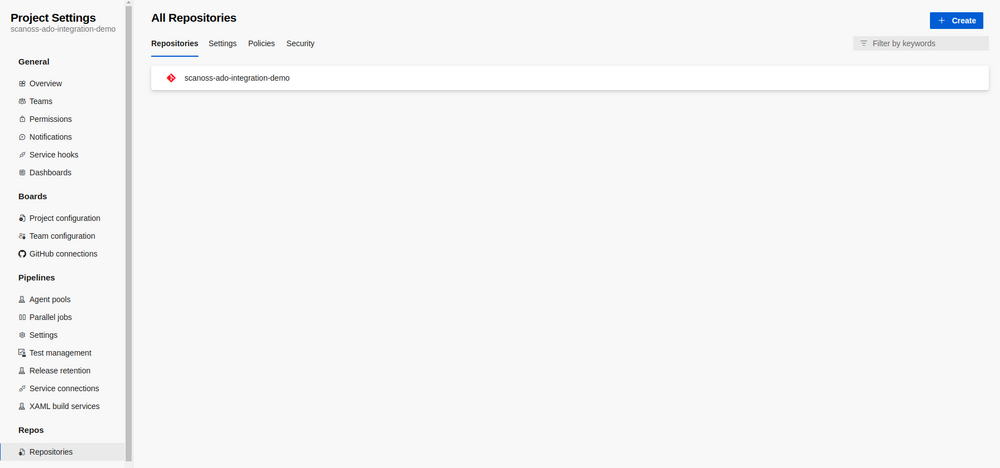
A) Allow Pull Request Contribute Access:
- Open the 'Security' tab.
- Select the repository Build Service account under the 'Users' group.
- Set the
Contribute to pull requests and Contribute" permissions to Allow.
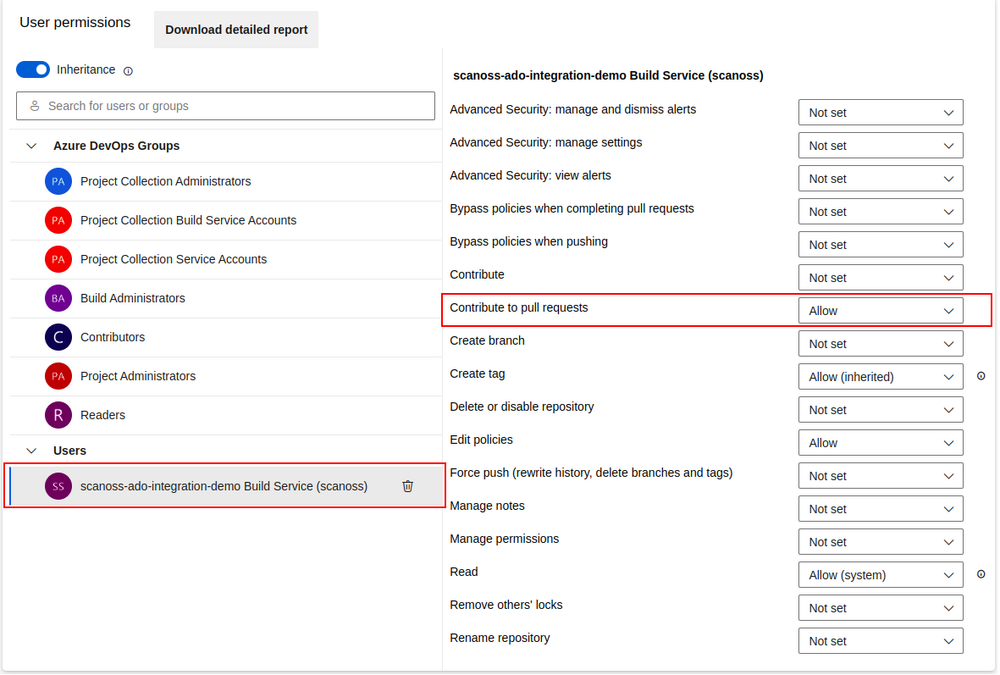
Personal Access Token (PAT) Configuration
A Personal Access Token (PAT) is only required when the setting Limit job authorization scope to current project for non-release pipelines is set to OFF (as shown below). If this setting is ON, no PAT is needed.

Create a PAT with the following minimum permissions:

B) Add Build Validation Policy to the integration branch:
- Open the 'Policies' tab.
- Select the integration branch under 'Branch Policies'.
- Add a new Build Validation Policy, configure the options, and save:
- Build Pipeline: Select your pipeline.
- Trigger: Automatic.
- Policy Requirement: Select your option.
- Build Expiration: Select your option.
- Set a display name.
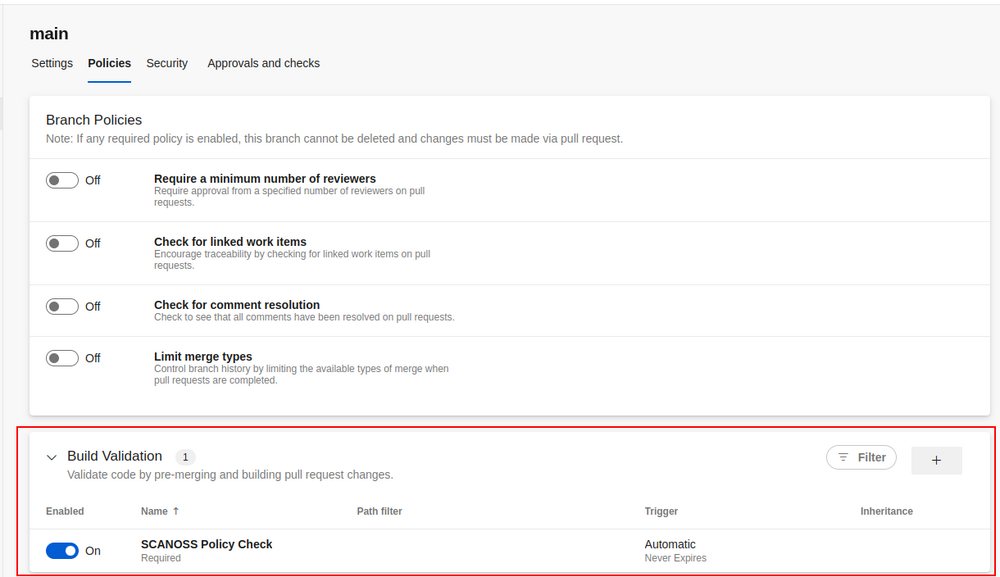
Azure agent jobs
If an Azure Agent Job is being run, ensure that the 'Allow scripts to access OAuth token' option is enabled. The SCANOSS Code Scan Task requires access to the System Access token to push the results to the PR.
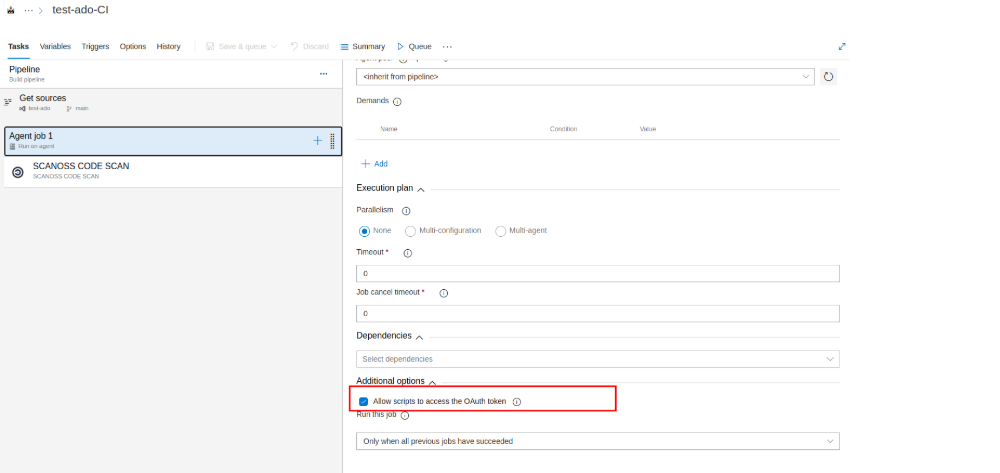
Pipeline
A basic pipeline should be set and the SCANOSS task should be included within it:
trigger: none
pr:
- main
pool:
vmImage: ubuntu-latest
##schedules:
## - cron: "*/5 * * * *" # Every 5 minutes
## displayName: "Run every 5 minutes"
## always: true # Ensures the pipeline runs even if there are no code changes
## branches:
## include:
## - main # Specify the branch(es) to trigger the schedule on
variables:
HTTP_PROXY: $(HTTP_PROXY_URL)
HTTPS_PROXY: $(HTTPS_PROXY_URL)
steps:
- checkout: self
persistCredentials: true
- task: scanoss@1.3.0
displayName: "SCANOSS Code Scan"
inputs:
# apiKey: $(APIKEY)
# apiUrl: 'https://api.scanoss.com/scan/direct'
policies: copyleft,undeclared
policiesHaltOnFailure: false
dependenciesEnabled: true
dependenciesScope: prod
NOTE:
Minor versions can be set by specifying the full version number of a task after the @ sign (example: scanoss@0.1.1). For further details, please refer to the task version.
3. Proxy Configuration
If your pipeline is running behind a proxy, add the following configuration to the pipeline:
variables:
HTTP_PROXY: http://your-proxy:8080
HTTPS_PROXY: http://your-proxy:8080
...
inputs:
runtimeContainer: '<self_hosted_registry>/scanoss-py:v1.15.0'
Inside the SCANOSS task add the runtimeContainer input with the address of your internal Docker registry.
Pipeline Triggers
In addition to being triggered by pull requests (PRs), pipelines can also be run manually and scheduled to execute at regular intervals.
When the pipeline is manually triggered or runs on a schedule, the results are uploaded only to the run artifacts.
| Parameter |
Description |
Required |
Default |
| outputFilepath |
Scan output file name. |
Optional |
results.json |
| dependenciesEnabled |
Option to enable or disable scanning of dependencies. |
Optional |
false |
| dependenciesScope |
Gets development or production dependencies (scopes: dev - prod ) |
Optional |
- |
| dependenciesScopeInclude |
Custom list of dependency scopes to be included. Provide scopes as a comma-separated list. |
Optional |
- |
| dependenciesScopeExclude |
Custom list of dependency scopes to be excluded. Provide scopes as a comma-separated list. |
Optional |
- |
| policies |
List of policies separated by commas, options available are: copyleft, undeclared, deptrack. |
Optional |
- |
| policiesHaltOnFailure |
Halt check on policy failure. If set to false checks will not fail. |
Optional |
true |
| depTrackEnabled |
Enable or disable Dependency Track SBOM upload and status reporting. |
Optional |
false |
| depTrackUrl |
Dependency Track server URL (e.g., https://deptrack.example.com). |
Optional |
- |
| depTrackApikey |
Dependency Track API key for authentication. |
Optional |
- |
| depTrackProjectId |
UUID of an existing Dependency Track project (alternative to name/version). |
Optional |
- |
| depTrackProjectName |
Dependency Track project name (required if projectId not provided). |
Optional |
- |
| depTrackProjectVersion |
Dependency Track project version (required if projectId not provided). |
Optional |
- |
| apiUrl |
SCANOSS API URL |
Optional |
https://api.osskb.org/scan/direct |
| apiKey |
SCANOSS API Key |
Optional |
- |
| runtimeContainer |
Runtime URL |
Optional |
ghcr.io/scanoss/scanoss-py:v1.45.0 |
| licensesCopyleftInclude |
List of Copyleft licenses to append to the default list. Provide licenses as a comma-separated list. |
Optional |
- |
| licensesCopyleftExclude |
List of Copyleft licenses to remove from default list. Provide licenses as a comma-separated list. |
Optional |
- |
| licensesCopyleftExplicit |
Explicit list of Copyleft licenses to consider. Provide licenses as a comma-separated list. |
Optional |
- |
| skipSnippets |
Skip the generation of snippets. (scan_files option must be enabled) |
Optional |
false |
| scanFiles |
Enable or disable file and snippet scanning |
Optional |
true |
| scanossSettings |
Settings file to use for scanning. See the SCANOSS settings documentation |
Optional |
true |
| settingsFilepath |
Filepath of the SCANOSS settings to be used for scanning |
Optional |
scanoss.json |
| debug |
Enable debugging |
Optional |
false |
| adoPat |
ADO Personal Access Token |
Optional |
- |
Policy Checks
The SCANOSS Code Scan Task includes three configurable policies:
Copyleft: This policy checks if any component or code snippet is associated with a copyleft license. If such a
license is detected, the pull request (PR) is rejected. The default list of Copyleft licenses is defined in the following file.
Undeclared: This policy compares the components detected in the repository against those declared in the scanoss.json
file. If there are undeclared components, the PR is rejected.
Dependency Track (deptrack): This policy integrates with a Dependency Track server to check for policy violations including security vulnerabilities, license violations, and compliance issues as configured in your Dependency Track policies. The policy check queries an existing Dependency Track project for violations and reports them in the pipeline.
Requirements:
- Dependency Track server URL and API key
- Either a project UUID or project name/version
- The policy runs even if SBOM upload is disabled, but will show warnings if checking against potentially stale data
Configuration Example:
inputs:
policies: copyleft,undeclared,deptrack
depTrackEnabled: true
depTrackUrl: 'https://deptrack.example.com'
depTrackApikey: $(DEPTRACK_API_KEY)
depTrackProjectName: 'my-project'
depTrackProjectVersion: '1.0.0'
Additionally, if it is a Pull Request, a comment with a summary of the report will be automatically generated.
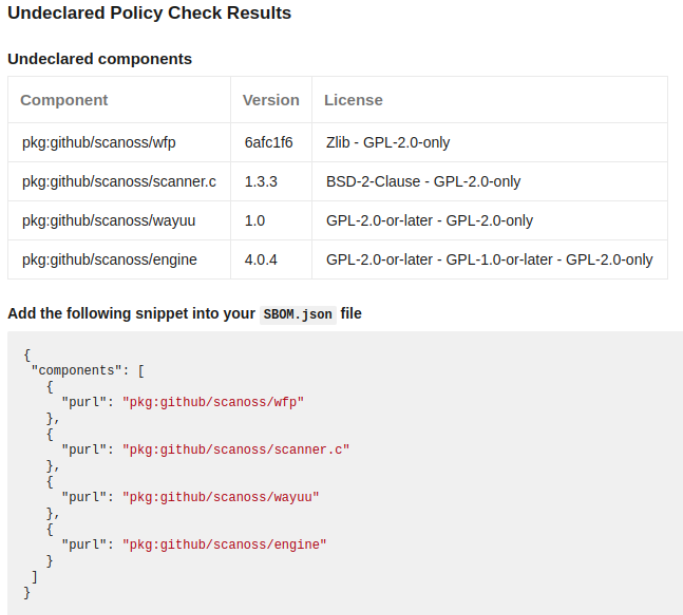

Scan Tuning Parameters
The SCANOSS scan engine supports scan tuning parameters for snippet matching.
Important: Scan tuning parameters must be configured through the scanoss.json. They are not configured as SCANOSS ADO input parameters.
Dependency Track Integration
The SCANOSS Code Scan Task integrates with Dependency Track to provide enhanced vulnerability tracking and policy enforcement. This integration consists of two main features:
1. SBOM Upload Status Check
When depTrackEnabled is set to true, the task will automatically upload a CycloneDX SBOM to your Dependency Track server and report the upload status as a separate PR status check. This status check provides:
- Success/Failure status: Visual indicator of whether the SBOM was successfully uploaded
- Upload details: Information about the uploaded SBOM including:
- Project name and version
- Number of components analyzed
- File size and upload time
- Direct link to the project in Dependency Track
- PR comments: Detailed success or failure messages posted as PR comments
- Troubleshooting guidance: If upload fails, helpful error messages with configuration tips
Note: The SBOM upload status check runs independently from the policy checks. You can enable SBOM upload without enabling the Dependency Track policy check.
Configuration Example:
inputs:
depTrackEnabled: true
depTrackUrl: 'https://deptrack.example.com'
depTrackApikey: $(DEPTRACK_API_KEY)
depTrackProjectName: 'my-project'
depTrackProjectVersion: '1.0.0'
2. Dependency Track Policy Check
The Dependency Track policy check (enabled by adding deptrack to the policies parameter) queries your Dependency Track server for policy violations and fails the build if violations are found. This is separate from the upload functionality and can be used independently.
See the Policy Checks section above for detailed information about the Dependency Track policy check.
Artifacts
The scan results and policy check outcomes are uploaded to the artifacts folder of the specific run of the pipeline.

Example Repository
An example use case can be found at the following link.










